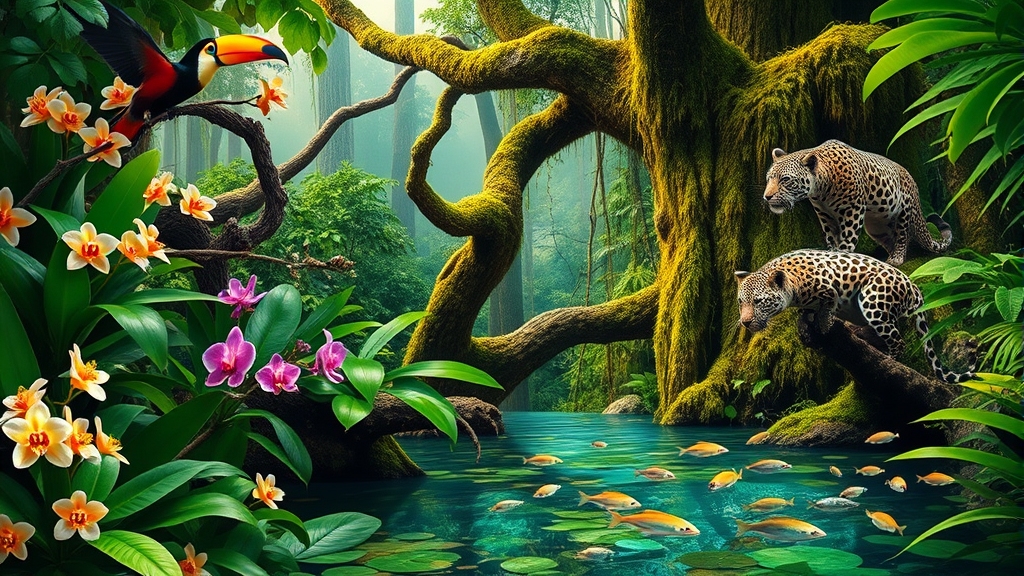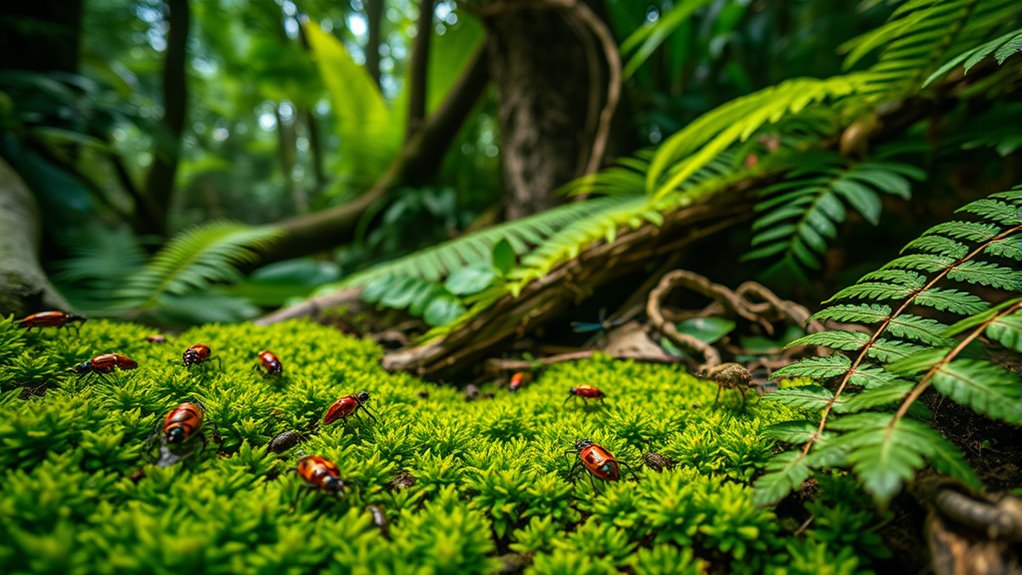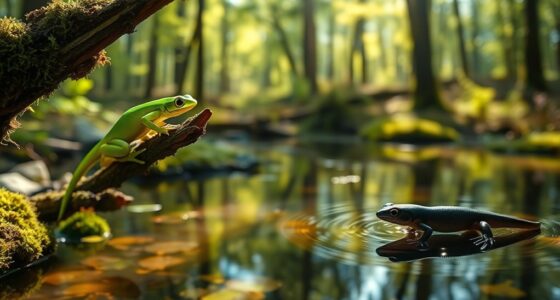Every species plays a crucial role in maintaining healthy ecosystems, which support your life through essential services like clean water, food, and climate regulation. Genetic diversity within species helps populations adapt and resist diseases, making ecosystems more resilient to change. When one species disappears, it can disrupt complex networks that sustain life on Earth. Keep exploring to discover how protecting each species helps preserve the balance that benefits everyone, including you.
Key Takeaways
- Every species contributes to ecosystem functions like pollination, decomposition, and water purification, essential for environmental health.
- Biodiversity enhances genetic variation, enabling species to adapt, survive, and resist diseases over time.
- The complex relationships among species create resilient ecosystems capable of withstanding environmental stresses.
- Protecting all species maintains ecosystem services that support human health, food security, and climate stability.
- Loss of even a single species can disrupt ecological balance, threatening long-term sustainability of life on Earth.

Biodiversity refers to the variety of life forms on Earth, including plants, animals, fungi, and microorganisms. It forms the foundation of healthy ecosystems that provide essential services supporting human life and environmental stability. When you think about biodiversity, you’re considering not just the number of species, but also the intricate relationships that sustain our planet. Each species plays a role in maintaining ecosystem services—such as clean water, air purification, pollination, and climate regulation—that directly impact your daily life. Without diverse species, these critical services could diminish, leading to less resilient environments and more challenges for humanity.
Understanding genetic diversity is key to appreciating why every species matters. Genetic diversity refers to the variety of genes within a species, which allows populations to adapt to changing conditions and resist diseases. When genetic diversity declines, populations become more vulnerable to extinction, and ecosystems lose resilience. For example, if a particular crop variety or native plant lacks genetic diversity, it might be less capable of withstanding pests or droughts. Preserving this diversity ensures that species can continue to evolve and adapt, safeguarding the stability of the ecosystems that support your food, water, and health. Maintaining genetic diversity is crucial for the long-term health of these systems. Additionally, protecting genetic variation helps ensure that ecosystems can recover from disturbances and adapt to environmental changes.
Genetic diversity helps species adapt and survive, ensuring resilient ecosystems vital for our health and environment.
Every species, no matter how small or seemingly insignificant, contributes to the bigger picture. In a healthy ecosystem, plants, animals, fungi, and microorganisms interact in complex networks—each fulfilling specific roles that support ecosystem services. For instance, pollinators like bees and butterflies are essential for crop production, while fungi help decompose organic matter, enriching the soil. These interactions depend on a broad pool of genetic diversity, which enhances the adaptability and resilience of populations. When species are lost, or genetic diversity shrinks, these networks weaken, compromising ecosystem services that you rely on every day. Protecting biodiversity is also vital for maintaining these interconnected relationships that support life.
You might not see the direct connection between biodiversity and your well-being, but it’s there. Protecting biodiversity isn’t just about saving wild species; it’s about maintaining the natural systems that keep life sustainable. Every species adds to the genetic diversity that fuels evolution and resilience, making ecosystems more capable of withstanding environmental stresses like climate change. By valuing and conserving biodiversity, you’re helping preserve the ecosystem services that ensure clean water, fertile land, and a stable climate—essentials for your health and future. The loss of species can lead to a reduction in ecosystem stability, which directly impacts human well-being. Recognizing the importance of ecosystem resilience helps underscore the need for ongoing conservation efforts. Ultimately, every species truly does matter, because their collective existence underpins the very foundation of life on Earth.
Frequently Asked Questions
How Does Biodiversity Impact Human Health?
Biodiversity directly affects your health by supporting ecosystem resilience, which keeps environments stable and clean. When ecosystems thrive, they help control diseases and purify air and water, reducing health risks. Additionally, many medicines are discovered from diverse species, making biodiversity crucial for medical advancements. By protecting various species, you guarantee a healthier planet that benefits your well-being now and in the future.
What Are the Main Threats to Biodiversity Today?
Imagine losing a crucial pollinator like bees; that’s a threat to your food supply. Today, climate change and habitat destruction are the main threats to biodiversity. These factors disrupt ecosystems, endanger species, and reduce genetic diversity. You can see this in real-world cases like deforestation in the Amazon, which destroys habitats and accelerates species extinction. Protecting biodiversity requires addressing these pressing threats to maintain ecological balance and your well-being.
Can Biodiversity Loss Be Reversed?
You wonder if biodiversity loss can be reversed, and the answer is yes, to some extent. Restoring genetic diversity and enhancing ecosystem resilience are key steps. Conservation efforts, habitat restoration, and protected areas help rebuild populations. While complete reversal is challenging, proactive actions can slow or stop further decline. Your support for sustainable practices and conservation programs makes a difference in helping ecosystems recover and maintain their biodiversity.
How Do Invasive Species Affect Native Ecosystems?
While it’s gentle to see invasive species as uninvited guests, their presence often leads to ecosystem disruption. These species outcompete native ones, alter habitats, and reduce biodiversity. You might notice native plants and animals struggling to thrive, as invasive species take over resources. Their spread can destabilize the delicate balance of ecosystems, making it harder for native species to survive and diminishing the overall health of the environment you cherish.
What Actions Can Individuals Take to Protect Biodiversity?
You can protect biodiversity by engaging with your community and promoting sustainable practices. Participate in local conservation efforts, support eco-friendly businesses, and educate others about the importance of native species. Reduce your ecological footprint by conserving water, minimizing waste, and choosing sustainable transportation options. Your actions, combined with community engagement, can make a significant difference in preserving ecosystems and ensuring that diverse species thrive for future generations.
Conclusion
Every species plays a crucial role in maintaining a healthy planet. Did you know that over 1 million species are currently threatened with extinction? Protecting biodiversity isn’t just about saving animals and plants—it’s about securing our future. When you support conservation efforts, you’re helping preserve the intricate web of life that sustains us all. Remember, even small actions can make a big difference in keeping Earth’s incredible diversity alive for generations to come.









